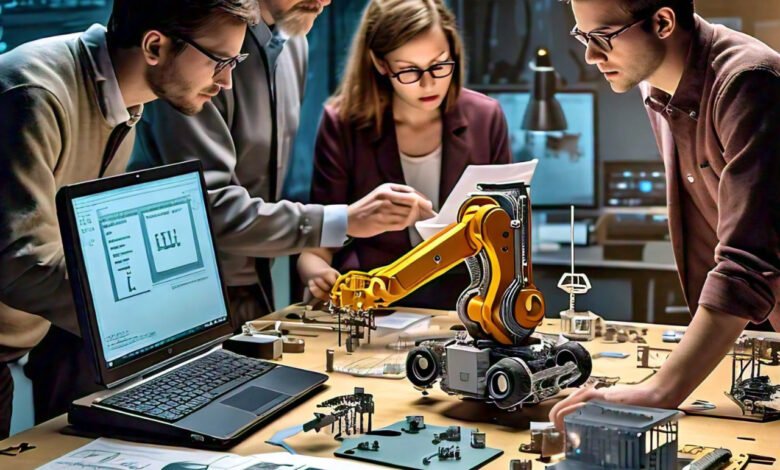REAL-WORLD APPLICATIONS AND CASE STUDIES

REAL-WORLD APPLICATIONS AND CASE STUDIES
Real-world applications and case studies are important for understanding how things work in real life and how well theories apply. They help show how ideas are used in practical situations. A case study is a powerful tool in research because it helps us deeply understand complicated issues in their real-world context. It uses different ways to gather information and gives us detailed insights that can help improve theories and real-life practices. Below are some examples of how practical applications and case studies are used in different fields:
1. Healthcare: AI in Diagnosing Diseases
- Application: AI helps doctors find diseases like cancer and diabetes by looking at medical images (like X-rays or MRI scans) or patient records faster than humans can.
- Case Study: IBM’s Watson for Oncology helps doctors choose the best treatments for cancer patients by studying medical books, patient data, and research papers.
2. Education: Personalized Learning
- Application: Special learning tools adjust lessons to fit each student’s needs, helping them learn better.
- Case Study: Websites like Khan Academy and Coursera suggest lessons to students based on their progress, making learning more engaging and easier to follow.
3. Finance: Blockchain for Safe Transactions
- Application: Blockchain technology makes sure financial transactions are secure and transparent by recording every transaction in a system that can’t be easily changed.
- Case Study: JPMorgan Chase built a platform called Quorum to make financial transactions faster and more trustworthy for people trading across different countries.
4. Supply Chain: IoT for Real-time Tracking
- Application: IoT devices help businesses keep track of their products in real-time, including where they are and their condition (like temperature).
- Case Study: Walmart uses IoT to follow the journey of its fresh produce, making sure it’s safe to eat and helping quickly find bad batches if there’s a recall.
5. Energy: Renewable Energy and Smart Grids
- Application: Smart grids use sensors and advanced technology to manage electricity better and allow energy from solar and wind sources to be used efficiently.
- Case Study: Boulder, Colorado, built a smart grid system that uses clean energy more effectively while reducing energy peaks and cutting pollution.
6. Retail: Using Data to Understand Customers
- Application: Stores use data to understand what customers like and suggest products they’ll enjoy.
- Case Study: Amazon recommends products to customers based on what they’ve bought or searched for before, leading to more sales and happy customers.
7. Agriculture: Precision Farming
- Application: Precision farming uses GPS and sensors to help farmers water crops, use pesticides, and take care of soil at the right times, increasing crop yield.
- Case Study: John Deere uses technology to monitor soil and help farmers know when to plant, resulting in better harvests and lower costs.
8. Transportation: Self-driving Cars
- Application: Self-driving cars use sensors and AI to drive on roads without human help.
- Case Study: Waymo, part of Alphabet, tests cars that drive themselves. These cars use AI to understand their surroundings, making driving safer and reducing accidents.
9. Manufacturing: 3D Printing
- Application: 3D printing allows factories to make complex parts with less material and money.
- Case Study: General Electric uses 3D printing to make airplane engine parts, cutting down on the time it takes to produce them and reducing waste.
10. Environment: Drones for Watching Wildlife
- Application: Drones with cameras are used to watch animals and track their movements, helping with conservation efforts.
- Case Study: The World Wildlife Fund (WWF) uses drones in Africa to keep an eye on endangered animals and stop poaching in real-time.
11. Transportation: Ride-sharing Apps
- Application: Apps like Uber and Lyft match people who need a ride with drivers nearby, using technology to reduce waiting time.
- Case Study: Uber uses surge pricing, which increases fares when many people want rides, encouraging more drivers to offer rides during busy times.
12. Real Estate: Virtual Tours
- Application: Real estate companies use virtual reality (VR) to give people a tour of properties without visiting them in person.
- Case Study: Zillow and Matterport offer virtual home tours, which became very popular during the COVID-19 pandemic when in-person visits were difficult.
13. Entertainment: Personalized Streaming
- Application: Streaming platforms like Netflix and Spotify suggest shows, movies, or music based on what users have watched or listened to before.
- Case Study: Netflix uses an algorithm that studies what users like and suggests new shows and movies to keep them interested.
14. E-commerce: Augmented Reality for Shopping
- Application: Stores are using augmented reality (AR) so customers can see how items like furniture would look in their homes before they buy them.
- Case Study: IKEA’s AR app lets customers see how a piece of furniture would fit in their rooms, making it easier for them to decide on purchases.
15. Law Enforcement: Predictive Policing
- Application: Police use data to predict where crimes might happen, allowing them to prevent crimes before they occur.
- Case Study: The LAPD uses a system called PredPol, which analyzes past crime data to predict areas with a higher chance of crime, helping reduce thefts and other property crimes.
16. Hiring: AI for Recruitment
- Application: AI helps companies speed up hiring by automatically screening resumes and matching candidates to jobs based on skills.
- Case Study: Unilever uses AI to evaluate job candidates by having them play games and do interviews. The AI analyzes this data to find the best candidates quickly.
17. Insurance: Personalized Car Insurance
- Application: Insurance companies use telematics devices to track how people drive and give them personalized premiums based on their driving behavior.
- Case Study: Progressive Insurance’s Snapshot program rewards safe drivers with lower insurance costs by tracking how they drive using a small device in their car.
18. Disaster Management: Drones and AI for Rescue Missions
- Application: Drones and AI are used during natural disasters to find people in need and plan rescue efforts faster.
- Case Study: During Hurricane Harvey, drones helped rescue teams assess damage and locate people who needed help, speeding up the response and saving lives.
19. Automotive: Electric Vehicles and Charging Stations
- Application: Electric vehicles (EVs) are eco-friendly cars, and companies are building charging stations to make it easier for people to own them.
- Case Study: Tesla’s Supercharger network helps EV owners charge their cars quickly, making long trips possible and encouraging more people to switch to electric cars.
20. Tourism: AI for Travel Planning
- Application: AI helps people plan their trips by finding the best flights, hotels, and activities based on their preferences.
- Case Study: Expedia uses AI to recommend travel options and lets users book trips with the help of a chatbot, making planning easier and faster.
21. Construction: Digital Models for Building
- Application: Digital models (BIM) help architects and engineers design buildings, reducing mistakes and improving communication during construction.
- Case Study: Denver International Airport used BIM to help coordinate the building of a new terminal, saving time and money.
22. Cybersecurity: AI for Detecting Threats
- Application: AI helps identify cybersecurity threats by spotting unusual activity in a company’s network.
- Case Study: Darktrace developed an AI system that learns what normal behavior looks like in a network, helping businesses detect and stop cyberattacks quickly.
23. Retail: Robots in Warehouses
- Application: Retailers are using robots in warehouses to help manage inventory and speed up the packing and shipping process.
- Case Study: Amazon uses robots to move products from shelves to packing areas, reducing the time it takes to ship customer orders.
24. Pharmaceuticals: AI for Drug Discovery
- Application: AI speeds up the process of discovering new medicines by analyzing vast amounts of biological data.
- Case Study: Insilico Medicine uses AI to help discover new drugs faster and cheaper, including treatments for diseases like cancer, and aging-related conditions.
These examples show how the latest technologies and smart ideas are solving real-world problems in different industries. They show how new tools like AI, big data, robots, and the Internet of Things (IoT) are being used to make things work better, safer, and more eco-friendly. Each case study also shows how industries are changing and growing to face new challenges and takes advantage of new opportunities.









